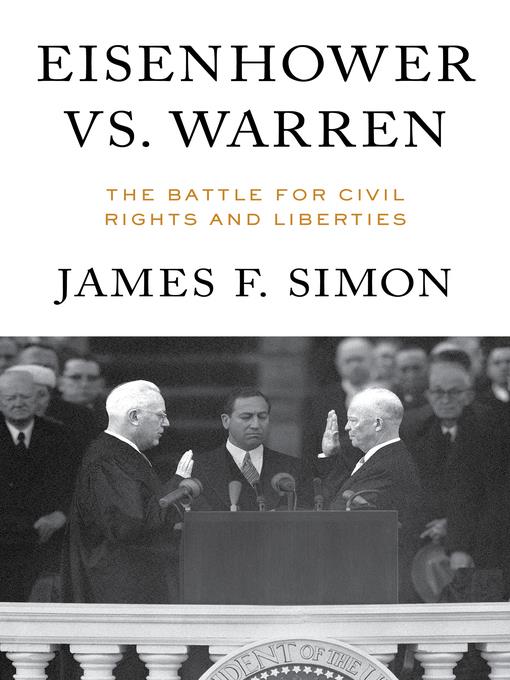
Eisenhower vs. Warren
The Battle for Civil Rights and Liberties
کتاب های مرتبط
- اطلاعات
- نقد و بررسی
- دیدگاه کاربران
نقد و بررسی

February 5, 2018
Simon (FDR and Chief Justice Hughes) uses twin biographies of Dwight D. Eisenhower and his Supreme Court chief justice Earl Warren to illuminate an often-overlooked period of legal history at the start of the civil rights movement. Simon’s major focus is the fallout between Eisenhower and Warren over the implementation of the court’s mandate to desegregate the country’s public school system following the unanimous ruling of Brown v. Board of Education. Despite his support for desegregating the armed forces and for civil rights in the context of federal employment, Eisenhower felt it best to integrate the schools at a pace acceptable to Southern senators and governors. Warren diametrically opposed this position; he held that the Constitution demanded that integration not be delayed. Simon is in top form, creating sympathetic portraits of both protagonists, capturing the historical context of Eisenhower’s presidency, thoroughly explaining the dynamics of the Warren Court, and, when necessary, looking past Eisenhower’s and Warren’s professed positions to expose their underlying motives and goals. This balanced account of the bitter relationship between Eisenhower and Warren presents a new lens through which to view the start of the civil rights movement.

February 15, 2018
Two midcentury giants clash behind the scenes over civil liberties.How much can a political leader do to advance necessary social change in the face of entrenched resistance without provoking a challenge to the legitimacy of governmental institutions? Disagreement on this point soured the relations between Dwight D. Eisenhower and Earl Warren, both hugely popular public figures. In September 1953, Eisenhower appointed Warren, a three-term governor of California with no judicial experience, as chief justice of the United States. Warren went on to forge a surprisingly liberal legacy, to Eisenhower's chagrin. While the Warren-led court broke new constitutional ground in many areas, former New York Law School dean Simon (FDR and Chief Justice Hughes: The President, the Supreme Court, and the Epic Battle Over the New Deal, 2012, etc.) focuses primarily on judicial responses to the nascent civil rights movement and to the political hysteria of McCarthyism. Warren coaxed a unanimous opinion from a conservative court in Brown v. Board of Education, declaring "separate but equal" public schools unconstitutional. The ruling brought him into conflict with Eisenhower, who never endorsed it, in part because he entertained serious practical concerns about the enforceability of court orders desegregating schools in rabidly hostile parts of the South. On national security grounds, Eisenhower, along with much of the public, also privately rejected court decisions defeating government efforts to punish suspected communists. While respecting Eisenhower's viewpoint, the author generally sides with Warren in faulting the president's failure to provide clearer moral leadership in the civil rights struggle or to stand up to the bullying McCarthy. Simon frames these conflicts within a robust, detailed narrative, clearly presenting the political and cultural milieu within which these two principled pragmatists worked. The author's presentation of discussions among the court justices about the legal issues at stake is particularly illuminating.A well-written, salutary illustration of the principle that honorable men can disagree about the pace and the means of effecting social change.
COPYRIGHT(2018) Kirkus Reviews, ALL RIGHTS RESERVED.

February 15, 2018
The author, dean emeritus at New York Law School, has written several times before on the relationship between various American presidents and the U.S. Supreme Court (Lincoln and Chief Justice Taney, 2006). The focus here is on, respectively, the Brown v. Board of Education decision and its aftermath (including Little Rock) and McCarthyism and civil liberties. Eisenhower, in both instances, is a middle-of-the-roader, even an equivocator, hardly an activist, though with a history of opposing segregation in purely federal contexts. Earl Warren, an Eisenhower appointee, is also a moderateit is a wide road to be in the middle ofbut Simon clearly favors his decisiveness and more expansive stance on civil liberties. Eisenhower, who also appointed William Brennan, famously described the appointment of Warren as his most regrettable decision, and the two principals' individuality, as well as their relationship to one another and to their associate justices, is skillfully and intelligently drawn. This is a cogently written book, especially given the complexity of many of the issues. Simon does great justice to an important segment of a critical period in American history.(Reprinted with permission of Booklist, copyright 2018, American Library Association.)

March 1, 2018
President Dwight Eisenhower (1890-1969) and Chief Supreme Court Justice Earl Warren (1891-1974), both moderate Republicans, served during an era of unprecedented economic growth and tumultuous social change, following World War II. Simon (emeritus, New York Law Sch.; FDR and Chief Justice Hughes) presents an insightful dual biography that reveals their achievements, frustrations, and complex relationship, which deteriorated soon after Eisenhower appointed Warren chief justice in 1953. Simon is at his best when describing how these once friendly men became alienated, as Eisenhower remained moored to his middle-of-the road politics, while Warren became leader of the Court's liberal faction, exasperated by Eisenhower's failure to move proactively on school desegregation. Meanwhile, Eisenhower was angered by Warren's use of the Supreme Court to resolve issues that the president felt should be decided by the legislature. Overall, both men are praised: Eisenhower for keeping the nation out of war and for supporting voting rights, and Warren for leading the judicial struggle for civil rights and individual liberties. VERDICT This compelling account of two giants of their time will find a wide audience among historians and informed general readers. See David Goldfield's The Gifted Generation for a view of Eisenhower as a stronger civil rights president.--Karl Helicher, formerly with Upper Merion Twp. Lib., King of Prussia, PA
Copyright 2018 Library Journal, LLC Used with permission.

























دیدگاه کاربران